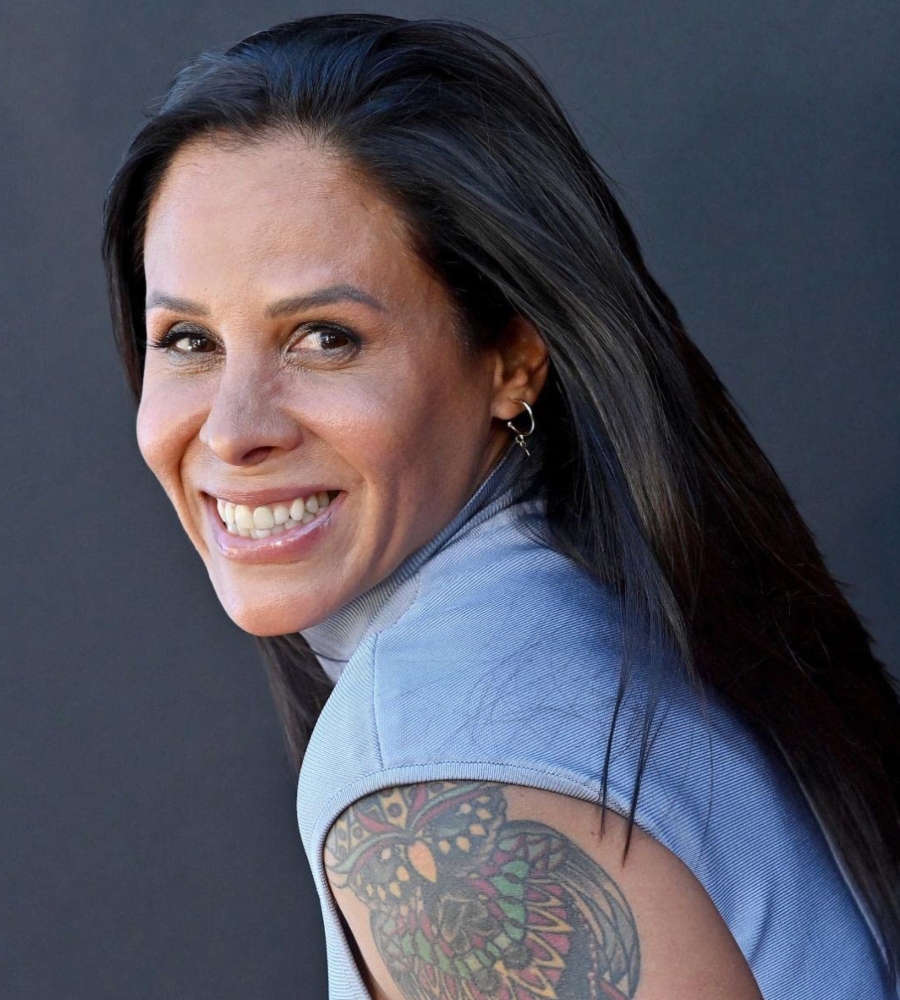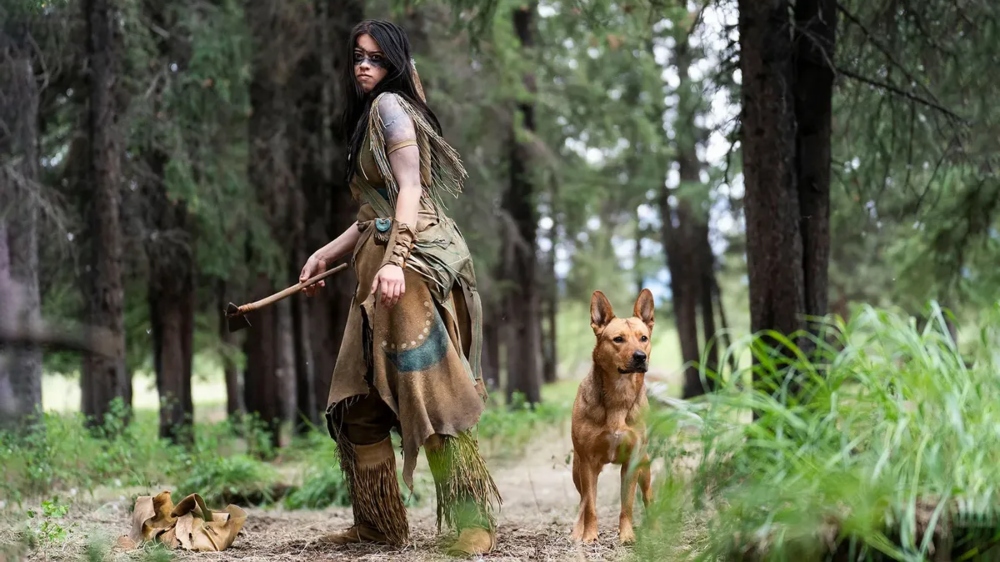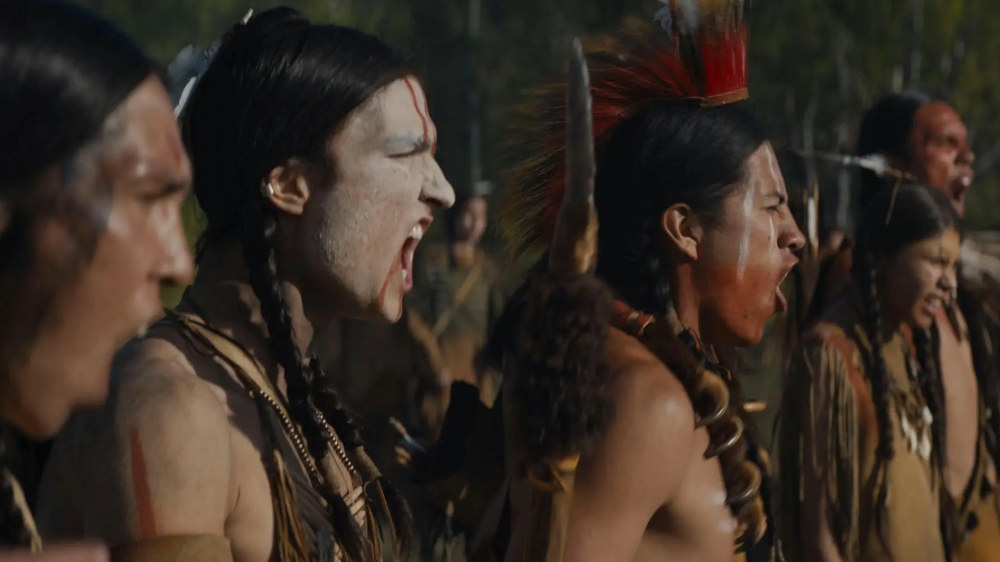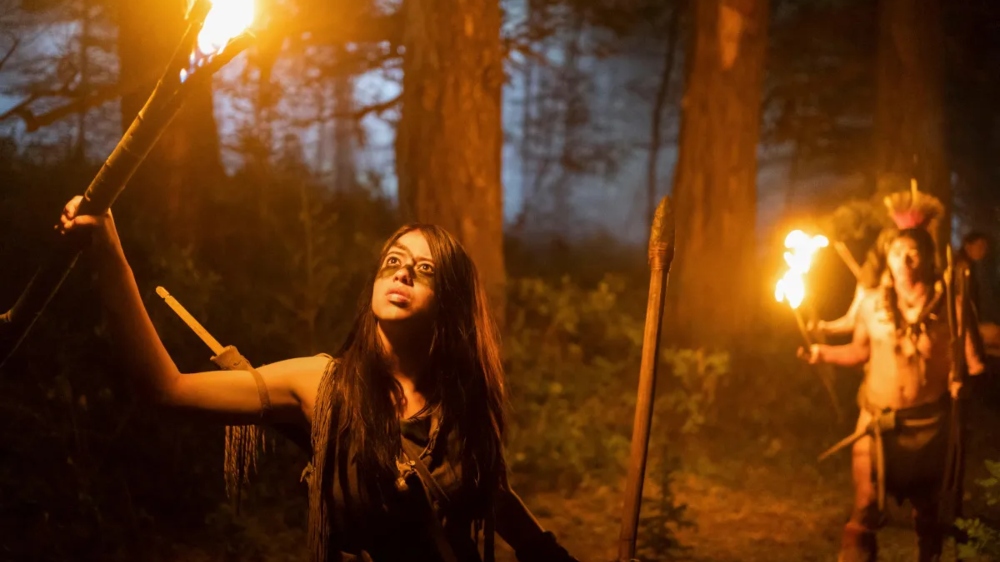Claudia Castello is living the life. She’s spent part of her morning surfing and now, her hair still wet, she’s on a Zoom call from her home in El Salvador to discuss her work as the Co-Editor of Prey, Dan Trachtenberg‘s well-received Predator prequel that’s now streaming on Hulu.
Castello and Angela M. Catanzaro earned an ACE Eddie Award nomination in the Best Edited Feature Film (Non-Theatrical) category for their joint efforts, and though Jamie Kennedy (Weird: The Al Yankovic Story) ended up winning at the March 5 ceremony, the well-deserved nod — Castello’s first such recognition — was quite an accomplishment, even for someone who previously worked with Director Ryan Coogler on Fruitvale Station, Creed, and Black Panther.
Below the Line recently spoke to the high-energy editor about the early days of her career, as well as her exceptional work on Prey. She also discussed her love of bodyboarding and how it helps her creatively, as well as the possibility that she may settle into the director’s chair herself one day.

Below the Line: Most people don’t grow up dreaming of being an editor. How did you discover the craft? Or did the craft discover you?
Claudia Castello: That’s how it happened. I didn’t grow up dreaming of being an editor. It was because my undergrad was in journalism. When I finished that — in Brazil — the market was very competitive, and the pay was bad. I thought, “Why don’t I go to the U.S. and learn some English? When I come back, I can get a better shot at being a journalist in Brazil.” I went to the U.S. to try a few classes here and there, and then it just happened.
I took one-on-one classes in broadcasting and film production. My English was never good enough, so I kept studying. The next thing I knew, I was editing a movie for a friend, and I realized, “I can be doing this. I kind of enjoy this thing — putting things together — and storytelling. My English is not great, so I can be behind the camera. I don’t need to be communicating a lot. I can deal with the machine.” I was a little bit shy back then. It was a perfect thing for me to be doing.
BTL: What do you see as the role of an editor in the overall filmmaking process?
Castello: I think of editors as shapers who mold humans as if they’re clay. We’re sculptors. The material comes in, and you have to put together motions, flow, and storytelling. It’s a vast range of things that you have to deal with, and you have to know every single frame of the movie. That little expression here and there is going to change the flow of the movie. Be aware of all the nuances, because, in the end, that’s what going to make you feel for [the] characters and understand the story. The role of an editor is so important, and most people don’t realize how important it is, because this is the third time we’re writing a movie — in the editing room, for the final one. That’s a lot of responsibility right there.

BTL: You’ve worked on short films, small-ish indie features, and with Ryan Coogler on mega-blockbusters. Would you say your job is exactly the same regardless of the scope of the project? Or is it different somehow?
Castello: Editing is the same. What changes is how you deal with the personnel, and how you communicate with different departments. If I’m doing a movie, for example, Black Panther or Prey, there are a lot of special effects. I have to go back and forth with the visual effects department. It helps me shape things. Some of the scenes have green screens. With Marvel movies, there are green screens all over the place. You have to be working [closely] with the VFX departments so you can create the imagery that’s going to be filling out the frames and the scenes. That’s the difference to me. Other than that, dealing with actors’ performances, the storytelling, and the cutting, is absolutely the same to me. I don’t think there’s a difference there.
BTL: Prey is a prequel. How much did you immerse yourself in the Predator universe before you started working on this film so that its DNA connected, in a way, to the movies that have come before it, even though they actually take place after the events of Prey?
Castello: Our advantage is that this is played as a sequel. We could be creating new rules, but because we have fans out there and expectations, we had to respect some of the aspects that are present throughout the franchise. For example, the heat vision, weaponry, cloaking, and the Predator being this technologically advanced creature, even though this movie takes place 300 years ago. We kept the DNA, as you said, and we applied it to this movie. We’re close to the franchise and to fans of the franchise. Me? I love the franchise.
BTL: Give us a sense of your collaboration with the rest of your team and with director Dan Trachtenberg, and take us through how you and Angela Catanzaro came to share the editing credit on Prey.
Castello: I didn’t collaborate with Angela; that came afterward. I went through all the scenes that were already shot, and then they did a rewriting of some scenes. Angela came on during the second phase. She put together a few of the scenes that were edited, the ones that were shot afterward, the pickups. What happened was — in the process — I got sick, [so] I had to leave for a little time, and she came in. I didn’t have the chance to collaborate with her, but the team that we had? I interviewed a lot of people, so we picked the best team possible. The workflow that was created there, when the team got together, was what made this machine work so well.
We went back and forth. The in-house VFX was right there with us, so that was helpful. Also, we had amazing assistants. It was one of the best teams I have ever worked with, actually. Dan was with me all the time, so it was great. He’s very present and collaborative. We would go back and forth with ideas, for sure. [Producer] Ben Rosenblatt was also in the room a lot. It was a trial of bouncing ideas over and over until we got to a point where there was a dead end, and said, “How do we deal with that dead end? Rewrite.”

BTL: How proud are you to be opening doors for women, and specifically Latina women, who want to do what you do?
Castello: To me, it is very flattering, and it’s humbling as well to have this opportunity, I’m in the right time and place. The movie-making industry is moving in this direction of opening up and hearing new stories. Everybody, at one point, gets tired of watching the same stories. You need to see different points of view. Different backgrounds are out there helping to bring these points of view to the screen. It’s great. In the same way, some women inspired me and made me think, “Oh, you know what? She’s just like me. I can be there too. It’s not an impossible thing to do.” This is very important, to have representation out there; to [be able to] look at somebody and say, “Hey, I can do that, too. If she can do it, I can too.”
BTL: Can you give me a couple of examples of women who inspired you?
Castello: This professor of mine brought several artists from the industry — all women — to talk about different roles: DP, directing, and editing. My USC professors, who are mentors for life, were Brenda Goodman, Reine-Claire, Kate Amend, and Bonnie Bruckheimer. The class I mentioned to you was taught by Bonnie and some of the guest speakers were Suzanne Todd, Vickie Rose Sampson, Audrey Marrs, Autumn Durald, Anette Haellmigk, and Gail Berman.
These women were incredible. They were inspiring. They were cheering for all of us. They said, ‘Look where I got.’ They were already in good positions in the industry. They were well-placed, and they were accessible. That relationship with people who are just starting is a very nurturing and enabling thing to do with new generations, and people who aspire to get there. It’s a great exchange.
BTL: Paying it forward…
Castello: Exactly. I intend to do that. Everybody who helps me out, I want to give back and pay it forward.
BTL: Movie fans love deleted scenes, but I’ve spoken to filmmakers and editors who dislike them sometimes because there are reasons why certain scenes aren’t in a movie. It can be to protect the actor. Or the movie is too long and some scenes simply have to go. What are your thoughts on including deleted scenes on a Blu-ray or DVD?
Castello: It’s fine, if the scene works well by itself. It’s also fine so fans can have extra insight [into] it, and people who are interested in filmmaking can understand why it’s not there. When we take something out… usually, I don’t miss anything. I’m great at leaving things behind and being objective to the point of, “Do we need this? We don’t need it. It should go.” Sometimes the director or the producers get attached to things because it was so hard to get or because the acting was so good. Usually, good acting stays on the screen, but sometimes it’s not-so-good acting or it doesn’t serve the story, so it has to go.

BTL: You are Brazilian, and you live in El Salvador. What are the film communities like there?
Castello: A production company started here and just recently they shot the first Hollywood/El Salvador production. It’s called Fireflies at El Mozote. Mozote is a region here, and they invited me to edit that movie. It’s a different budget category [than] the movies I’m used to doing. It’s a movie that represents so much for the Salvadorians, and this country has given me so much. I’ve been in the U.S. for 22 years, and I’ve been here for one year.
The people here are so generous and genuine, so I feel [like] it’s giving back. I’ve been honored [by] the opportunity to do this movie. They have great actors. There are a lot of challenges because the industry here is [just] starting, so people aren’t used to the pace of a Hollywood movie, but they just opened this door. A lot of things are about to come. I’ve heard about two new productions [already]. It’s great to know that this tiny country that has a lot of culture is getting the shot to start making more movies that will be seen by the world.
BTL: You’re an avid bodyboarder. How often have filmmakers asked you to not bodyboard during production, so that you don’t risk getting hurt in the middle of a show?
Castello: Oh, nobody ever asked me that. This is life for me. I surf, also — I bodyboard and longboard. Every day here in El Salvador, I go out there. I get an hour-and-a-half to two hours of surfing, which completely changes everything about me. It gives me so much energy and a clearer mind. No, they never said that. Maybe they will want me to work an extra hour. It’s going to be hard for me to wake up early and do the one hour that changes my life, but I’m going to always try to do that. Some days I can’t because I’m too tired. Editing takes a lot out of you, but if I can, I will go. It’s game-changing for sure.
BTL: You’ve collaborated with several very talented directors. How interested are you in one day sitting in the director’s chair and calling “Action!” yourself? Or are you happy doing what you do now?
Castello: I am definitely considering that. There are a couple of projects that came my way, and I have to be honest with myself. I’m at a point where I don’t want to try a project that doesn’t [speak] to me. It has to be the right project. When that comes, if that comes, if I go get it… I know it has to [speak] to my heart because editing — filmmaking — is hard work. I’m already established as an editor. I already have a comfortable life, [so] to then start a new step in my career would take a lot out of me. Maybe it will be a step down to go up again, if I’m clear about it. I’m waiting for that step to be worth taking.
Prey is now streaming on Hulu.





